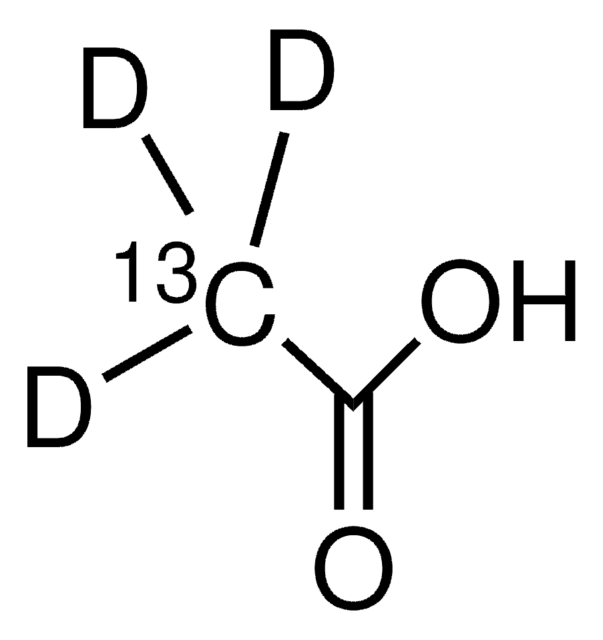151785
Acetic acid-d4
≥99.5 atom % D
Sinónimos:
Acetic-d3 acid-d, Tetradeuteroacetic acid
About This Item
Productos recomendados
vapor density
2.07 (vs air)
Quality Level
vapor pressure
11.4 mmHg ( 20 °C)
isotopic purity
≥99.5 atom % D
assay
≥99% (CP)
form
liquid
autoignition temp.
800 °F
expl. lim.
16 %
technique(s)
NMR: suitable
bio NMR: suitable
impurities
≤0.0500% water
water
refractive index
n20/D 1.368 (lit.)
bp
115.5 °C (lit.)
mp
15-16 °C (lit.)
density
1.119 g/mL at 25 °C (lit.)
mass shift
M+4
SMILES string
[2H]OC(=O)C([2H])([2H])[2H]
InChI
1S/C2H4O2/c1-2(3)4/h1H3,(H,3,4)/i1D3/hD
InChI key
QTBSBXVTEAMEQO-GUEYOVJQSA-N
¿Está buscando productos similares? Visita Guía de comparación de productos
Categorías relacionadas
General description
Application
Acetic acid-d4 may also be used as a deuterated solvent in the 1H NMR spectral studies of the following:
- CB2, a CNBr peptide
- α - tocopherol succinate hydrophobically modified chitosan(CS-TOS)
Recommended products
signalword
Danger
hcodes
Hazard Classifications
Eye Dam. 1 - Flam. Liq. 3 - Skin Corr. 1A
Storage Class
3 - Flammable liquids
wgk_germany
WGK 1
flash_point_f
104.0 °F - closed cup
flash_point_c
40 °C - closed cup
ppe
Faceshields, Gloves, Goggles, type ABEK (EN14387) respirator filter
Elija entre una de las versiones más recientes:
¿Ya tiene este producto?
Encuentre la documentación para los productos que ha comprado recientemente en la Biblioteca de documentos.
Los clientes también vieron
Artículos
Use this reference table to find the coupling values and chemical shifts of our NMR (deuterated) solvents. Melting and boiling points, molecular weight, density, and CAS number are also listed.
Use this reference table to find the coupling values and chemical shifts of our NMR (deuterated) solvents. Melting and boiling points, molecular weight, density, and CAS number are also listed.
Use this reference table to find the coupling values and chemical shifts of our NMR (deuterated) solvents. Melting and boiling points, molecular weight, density, and CAS number are also listed.
Use this reference table to find the coupling values and chemical shifts of our NMR (deuterated) solvents. Melting and boiling points, molecular weight, density, and CAS number are also listed.
Nuestro equipo de científicos tiene experiencia en todas las áreas de investigación: Ciencias de la vida, Ciencia de los materiales, Síntesis química, Cromatografía, Analítica y muchas otras.
Póngase en contacto con el Servicio técnico













